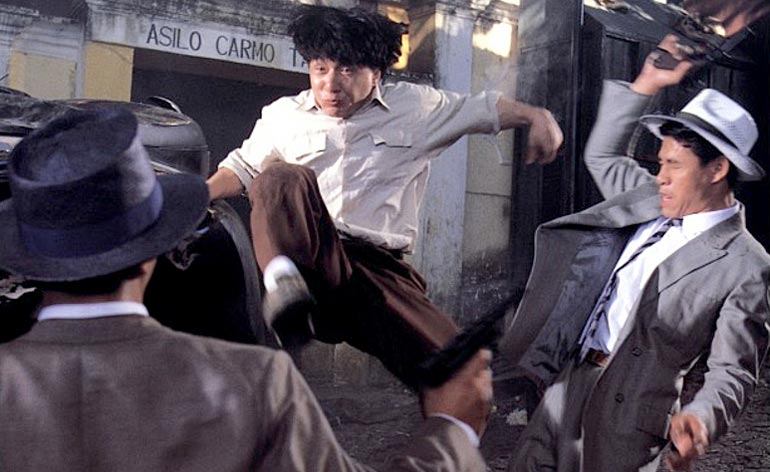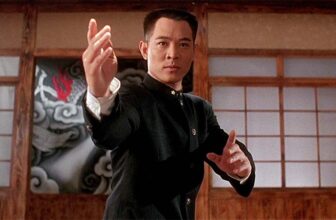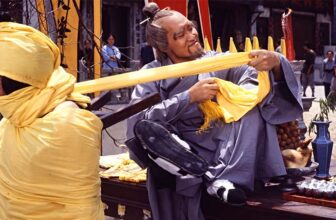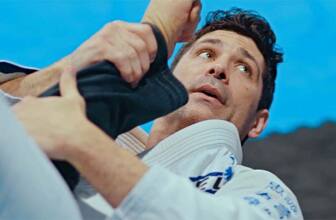
There’s a long and glorious tradition in Asian cinema of historically significant martial artists being the subjects of fictionalized apocrypha and none can stake a greater claim in this arena than Wong Fei-hung! He’s the Chinese answer to everyone from Robin Hood to Billy the Kid and the subject of over one hundred films. For his 21st century reboot, “Rise of the Legend” makes him the subject of a kind of superhero origin story, one that could easily have been titled “Fei-Hung Begins” and carried just a strong a connotation.
Trailer
Cast
Rising star Eddie Peng Yu-yan assumes the role of the legendary Chinese folk hero Wong Fei-hung while Sammo Hung makes his latest villainous turn as Master Lui, leader of the infamous Black Tiger gang who serves as both a mentor figure as well as antagonist for our hero.
He finds another such frenemy in the gang in the form of Black Crow played by Byron Mann, while Tony Leung Ka-fai appears as Fei-hung’s father, Wong Kei-ying. Angelababy portrays the local courtesan Orchid, while several names that’ll be instantly familiar to fans of Fei-hung’s adventures appear too such as Foon, played by Qin Junjie, and Big Tooth, played by Cho-Lam Wong. Additionally, the ever show-stopping Zhang Jin of “SPL 2” and “Ip Man 3” fame portrays Wu Long, who arrives to put Fei-hung’s legendary Hung Gar skills to the test.
Plot
In 1868, the city of Guangzhou is at the mercy of two warring crime factions, The Northern Sea and the Black Tiger Gang which falls under the leadership of the nefarious Master Lui. He believes he’s found his greatest henchman yet in the form of a 21-year old Hung Gar exponent named Wong Fei-hung, who takes down a huge swath of the Northern Sea in a brutal street fight, and literally brings Master Lui the head of their leader.
Impressed with his tenacity and fighting skill, Master Lui makes Fei-hung his godson and one of his designated “Four Tigers”. What he doesn’t know is that Fei-hung has an entirely different agenda on his mind than organized crime and has infiltrated the Black Tiger Gang with the intent of bringing it down from within.
Action
It’s to the credit of “Rise of the Legend” that it goes out of its way to chart its own course that’s unique from past portrayals of Wong Fei-hung. Eddie Peng’s rendition of Fei-hung is a far cry from the warrior scholar embodied by Jet Li, or even the rambunctious goofball portrayed by Jackie Chan. Chinese audiences and filmmakers alike have always shown a preference towards historical fiction over bio-pics when it comes to figures like Fei-hung, which is why we see him plugged into everything from comedies like “Drunken Master” to historical epics like “Once Upon A Time in China”. We’ve already seen everything from a version of Fei-hung who can hold his liquor better than anyone (“Drunken Master”) to one played by a teenage girl (“Iron Monkey”), so why not a version that’s a vigilante determined to clean up his city?
Now, with that said, that doesn’t mean that “Rise of the Legend” is without its own missteps. The action sequences throughout the film, coordinated by the esteemed Corey Yuen, cover a spectrum that ranges from inspired to bizarre. The most widely-marketed fight in the film, a duel in the rain between Fei-hung and about a hundred or so Northern Sea henchmen is one of the most visceral, perhaps even savage Wong Fei-hung fight scenes ever brought to film. It’s by far the best moment in the entire movie, which makes the tonal whiplash of later action sequences so jarring.
For being a Wong Fei-hung film, much of the kung fu in “Rise of the Legend” bears a closer resemblance to another Jet Li vehicle, his 2001 sci-fi-martial arts hybrid “The One”. Chinese and Hong Kong filmmakers have gotten noticeably better about being subtler with their use of wire-fu in the 21st century, but “subtle” is the last thing “Rise of the Legend” can be called in this regard.
In the fight sequence where Master Lui stands his ground against a swarm of opponents while Fei-hung faces off with Wu Long, you’d be forgiven for thinking that the characters inhabit ‘The Matrix’ after the eighth time Fei-hung leaps about six yards across the room, or the admittedly pretty cool bullet-time shot of he and Wu Long falling/flying out of the building the kind of distance that would come after being shot out of a canon.
This kind of over-the-top wire fu just doesn’t mesh well with a Wong Fei-hung movie that wants to go the “dark and gritty” route, which is why it’s such a relief that the final duel between Fei-hung and Master Lui dials it down a bit and places them in a building engulfed in flames. If only they could’ve found some excuse to work “The Roof is on Fire” into the soundtrack for this set piece.
Summary
“Rise of the Legend” is enjoyable but also uneven. Taking Wong Fei-hung into this kind of darker, more hardcore territory was a wise decision in rebooting him for audiences in the “Ip Man” era, but it doesn’t adhere closely enough to what that kind of approach entails for the film to fully gel. Of course, no Wong Fei-hung movie would be complete without his theme song, “A Man Should Better Himself”, and boy did this one hold off on it until just the right moment!
Trivia
- Sammo Hung also appeared in 1978’s “Magnificent Butcher” in the role of Butcher Wing, a student of Wong Fei-hung, portrayed in the film by Kwan Tak-hing, who had already played Fei-hung dozens of times by that point.
- Later, Sammo would make a cameo in the film “Around the World in 80 Days,” as Fei-hung himself – and alongside former Wong Fei-hung Jackie Chan, no less!
- Mike Leeder makes a cameo in the film. He also appears in the first two “Once Upon A Time in China” films.
- Eddie Peng and Angelababy both also appeared in “Tai Chi Zero” and “Tai Chi Hero”.







I enjoy reading your features and I want to know where to learn kung fu in London? Thanks!